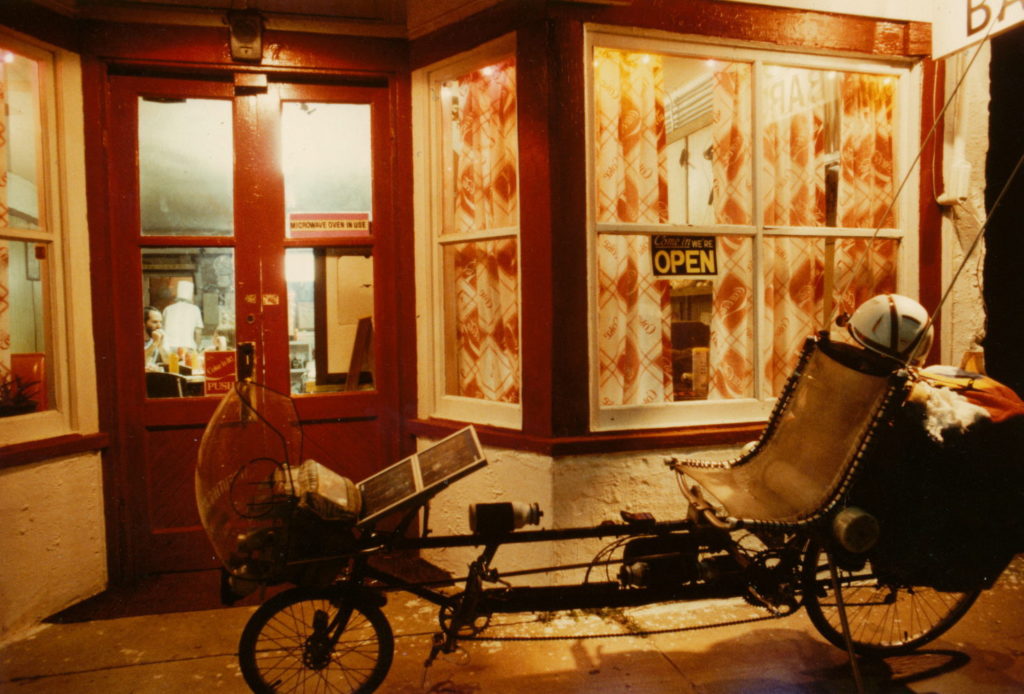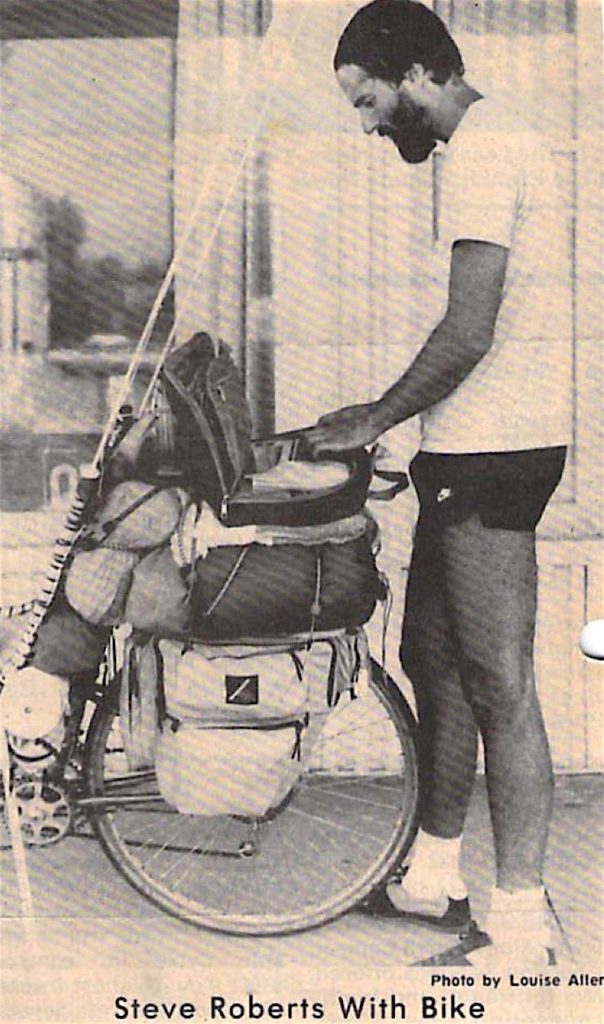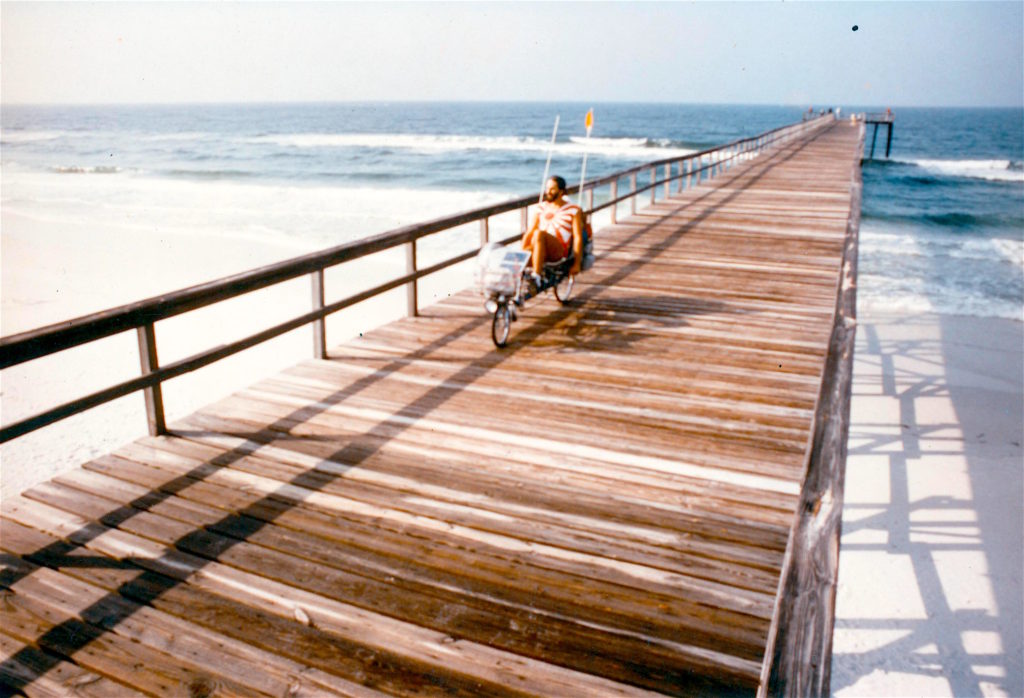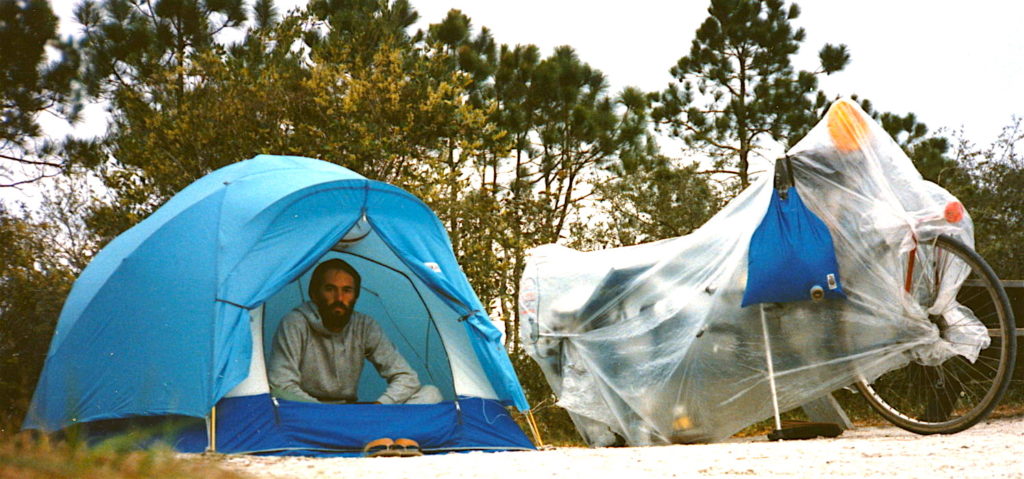
A Grand Farewell
Computing Across America, Chapter 27
by Steven K. Roberts
April 2, 1984
(photo above by Dan Burden)
Panaceas are a dime a dozen.
— Kacy Branstetter
The first big issue of the panhandle involved a fork in the road. I pedaled south from fragrant Tallahassee, the dogwoods and azaleas flashing in the sun, flowers brightening even the tackiest of yards, everything green, green. This is a town that takes Spring seriously. I rode along route 263 with two local cyclists, talking about the basic issues of life (computers, bicycles, knee pain, and helmet mirrors), then suddenly realized that one of the journey’s more difficult choices lay just ahead.
Should I pass through Panacea or Sopchoppy on my way to Appalachicola?
My friends turned back, after making me a gift of the first decent helmet mirror I had ever used (the “Third Eye”). The decision was to be mine alone. Panacea or Sopchoppy. Hmm. I stopped in Medart and signed on via pay phone, hoping to find advice from Kacy on the matter. “Sopchoppy is a once-in-a-lifetime opportunity,” said her message on the little screen. “Panaceas are a dime a dozen.”
But I was feeling low and broke, so I chose Panacea anyway. I needed one.
Kacy had been right. It didn’t help.

I pressed on in blazing sunshine to Lanark Village, which hadn’t been my intention at all until I was passed by a lady in an orange Karmann-Ghia. Even that wouldn’t have put Lanark Village on my map, but the little car reappeared a mile later, parked by the side of the road. I pulled alongside with a hearty “Hi there!”
She quickly straightened from her position under the dashboard and looked at me in fright. I smiled. “Oh, sorry — I didn’t mean to startle you.” It followed that her accelerator pedal had separated from the cable, so I crawled in there with my tool kit and random hardware bag to patch the thing. The loop of steel wire wouldn’t last long, but it would get her home.
But while I lay clumsily prostrate, half in the ragged little car and half on the highway, her brother’s pickup truck skidded to an emergency stop and he ran back to see what the hell was being done to his sister. The moment he laid eyes on my bike, his whole plump face lit up. “God damn, you’re that guy from Ohio I seen on TV!”
I grinned. “Guilty as charged.”
“Well alright! Man, you gotta come have dinner with us! You gotta, man!”
An invitation like that leaves me no choice. I backtracked three miles and knocked on the specified door, where I had been told to ask for Dickie.
A lumbering fellow — sort of half-soft and half-menacing — stood scowling in the doorway, looking me up and down and peering past me to the bike. Wire-rimmed glasses perched on his nose, and his unruly hair was streaked with grey. “I’m looking for Dickie,” I said.
He glared at me. “Name’s Richard! I can’t stand the name ‘Dickie’!”
“Oh, uh, sorry. I met Roger and Donna… they said for me to come for dinner.”
“Hmph.”
But we were soon friends, and I rolled the bike into the garage. Two kids buzzed about like mosquitos, quickly discovering how to clear the data on the Push, flash the lights, and toot the horn. Over the years they had grown immune to scolding, so I kid-proofed the machine as much as possible and put the computer out of reach.
Roger — plump, earnest, and likable with occasional humorous twinkles — returned from an electrical service call and began writing a delightful country/folk ballad in my honor. Richard demonstrated his implements of the martial arts. Their dad (Earl) came in — a kind, colorful fellow who had survived five years of chemotherapy and a rough 1940’s life as a lineman in the Louisiana swamps.
We sat in the basement/workshop/bedroom and talked long into the night, making a midnight foray to a local foot-stompin’ bar for more beer. We spoke of Russia and had a great round of patriotic fervor while Richard, a surprisingly good artist, put the finishing touches on a “Hawkman” character and Joni Mitchell sang incongruously on television.
Suddenly Eric Clapton started playing. Roger dashed across the room with his guitar and hunched over to play along.
“What are ya tryin’ to do, get in my light?” Richard asked irritably.
“Just tryin’ to see them licks!” A pluck. “Shit!” He peered intently at the screen. “Damn, that sonofabitch is good! But he ain’t got shit on me, man, except for a coupla jillion dollars and a million years more experience.”
“Aw, I’ve heard you play. You’re good. They ain’t got nothin’ on you.” Richard adjusted his glasses and went back to his picture.
Young Chris snored kidlike on the bed. I sat on a mattress in the corner, scribbling furiously in my journal, marveling at yet another lifestyle and wishing that tape recorders weren’t so obtrusive. I fantasized about taping my whole life, then resolved to learn shorthand.
I mean, really. The stories, the personalities, the experiences — they zip by in an instant, wonderful and irreproducible, laden with color. My host back in Interlachen had related a thrilling tale of his truck-drivin’ days, slipping overloaded past the cops at a Louisiana weigh station. He made me hear the crackling of the CB and feel the close midnight warmth of the truck cab, all the way down to the smell of thermos coffee. Gone. Earl had kept me spellbound earlier this evening with stories of stringing power lines across the Atchafalaya Swamp — back before there were roads. My legs itched with leeches and mosquitos as he talked; my skin crawled with night sounds. Gone.
I felt helpless, and was suddenly suspicious of those travel books with long, detailed conversations in quotes. Suuure. Unless I blatantly record every word, I have to entrust the real magic to the subjective vapors of memory. This night was special, filled with human warmth and glimpses into another, almost dreamy world — yet the idiomatic dialogue with its surprising twists is gone, gone.
And another thing, while I’m sitting here bitching. What about real people?
I’ve been fretting about this all across the country. Think about it: I roll into town, meet people, and become involved in their lives. I have affairs. I see behind the shutters of privacy and decorum. I share my time and energy with the rich, the rowdy, the religious, and the reprehensible — people of all descriptions from the dull to the enchanting. They open their lives and turn me loose in their homes. And stories are born.
This creates some difficulty.
As this project began to take shape, I read some other travel books — Jenkins, Moon, Theroux — to see how they dealt with this problem. Jenkins, in A Walk Across America and its sequel, keeps everything reasonably charming, managing to avoid potential embarrassment by devoting significant space to identifiable people only when he can say nice things about them. Moon, in the insightful Blue Highways, stays safely distant and academic, training his keen eye on everything except private lives and human relationships. Theroux, in The Old Patagonian Express, is a master of description but is constantly on the go in foreign countries. Personal issues don’t seem to arise.
Great. So do I skip the juicy parts to keep the characters from chasing me down in dark alleys? Do I write the truth and then move quietly to Tibet a few days before publication? Do I change names, knowing that people are going to recognize themselves anyway? Do I soften everything and make it incapable of offending, in the process making it equally incapable of stimulating?
No, no, no, and no. This journey has been a motherlode of amazing experiences, and I’ll be damned if I’m going to dilute them even more than I already have with time, editing, and less-than-perfect memory. “All writers are betrayers,” said Bob Magill at the hostel in Key West. It would hardly do for me to tease you with the opening of doors and then not tell what happens behind them, would it?
Let’s see… are we still in Florida? Ah yes — coming up on Carabelle, home not only to the country’s smallest police station (a phone booth) but also to the father of Sara Purcell from Real People (the TV show this time). Folks in these parts seem pretty proud of those things, but nobody thought to warn me about the sign at the east end of town: NO BICYCLES
Well, now what? There weren’t any other roads that I could see, and I sure as hell wasn’t going to turn back, so I went for it and hoped the guy in the phone booth would be looking the other way.
But he peered at me hard, doubtless trying to decide whether or not this qualified as a bicycle. I nodded calmly as if I belonged there, and pedaled on over to Apalachicola where the museum housing the world’s first ice machine was closed for lunch.

Panama City — a photographic rendezvous with Dan and Lys Burden. I arrived at the end of an 87-mile tailwind day, met my friends for dinner, did some classic high-tech/low-tech contrast shots around town, and then rode to the hostel.
The big issue here was the bike. The hostel had the warmth and old polished wood of a lovingly maintained home, and I soon saw why: the lady who ran the place was about ninety and very religious. I asked her if I could bring the bike inside.
“No, I’m very sorry. That will have to stay in the backyard.”
“But it’s my life!”
“No, it’s a bicycle. Your life you can bring inside.” She smiled disarmingly, fragile but very sure of herself.
Not happy with the arrangement, I found a spot under the window outside the men’s bunkroom, locked it up, and set the alarm. The sky was clear, but I threw a tarp over the bike anyway and found a few items of behind-the-shed debris to lean against it. Anything to reduce temptation.
Five of us dozed off in the pleasant camaraderie of hostelers everywhere, but by morning I was a mighty unpopular guy — and didn’t even know it. Four times in the night, the beeper had been triggered by rain, and the others kept waking up to turn it off. Ah, security.

Moving on, moving on, as eager for the end of Florida as I had been for its beginning. Maybe a state line would cure my ills. I camped in Grayton Beach next to the editor-in-chief of Encyclopedia Brittanica, made a surprisingly delicious crab glopola on the Swedish firebomb, and played Junior Army Corps of Engineers by trenching around my campsite in anticipation of heavy rain. But depression hung in the close air of the tent like the ambience of a funeral parlor. The money problem that had tormented me in Key West had grown steadily worse, obscuring the exuberance of my adventure and complicating every thought with desperate calculations. This appears in the journal of that bleak day:
Messages back and forth with Kacy are not encouraging — copier sick, computer acting strange, packages lost in the mail, no money, late phone bill, three house payments and two car overdue, no luck selling either, Online Today crisis, small Prentice-Hall check not here yet, etc, etc, etc. It’s hand-to-mouth time, and I fear for the trip. Lonely, too, and I have a headache. No progress on Byte article and the day is almost gone. No nuthin. This is serious. To wit, I now make another fucking list, with the emphasis on money. I need some bad. A job in Pensacola, maybe? Sigh.
But Florida gave me a grand farewell.
I had entered the state in Jacksonville, expecting everything and finding nothing. I left via Pensacola, expecting nothing and finding everything.
There’s a lesson in there somewhere.
The week began with a blustery, Outer-Banks-like approach along desolate Santa Rosa Island. It was chilly and wet, and my only objective was a pay phone so I could check in with a local contact and find an indoor place to sleep for free.
But then my life changed. “Call Frank,” said the EMAIL message from Kacy, without further elaboration. His familiar voice was like a touch of home, a reminder of simpler times in Ohio — back when there was cash flow and a stable girlfriend. After the preliminary chitchat, he told me the news…
The house sold!
The closing would be in two weeks, cash, clean, no contingencies. My $700 monthly payments would go away; the old debts would be erased. I’d be able to pay Lumbotech and stay out of jail (or debtors’ prison, or wherever they put people these days). I yelped with delight and set out to probe the Pensacola social world with a newfound exuberance, knowing that at last the stress I had been dragging like a trailer full of concrete was about to fall away.
There was love and promise in every smile, every highway sign. I took the assets in my left hand and the liabilities in my right, tossed ’em all up in the air, and pedaled out of debt for the first time in a decade. Florida had dripped with promise, and she was now leaving an exquisite taste on my lips.
For a week I played in Pensacola. Sylphide drove in for a celebratory rendezvous. I explored, did the Media Dance, made new friends, got papers notarized, stayed with a laid-back ex-Navy man, and generally exulted in my official homelessness.
At last I was through with poverty, through with Florida, and ready for the next major phase of the journey.
Personal Note: This was a wonderful moment, and got me up to zero… though in retrospect it was not exactly a real-estate success story. I had bought the house for $75K four years earlier, and sold it for exactly that… but I was lucky in that market slump to extract my little bit of equity! I visited the place a couple years later and they had a gleaming hardwood floor… I complimented them on it, and the guy said, “Hell, all we did was pull up that ugly old carpet.” <sigh>


You must be logged in to post a comment.